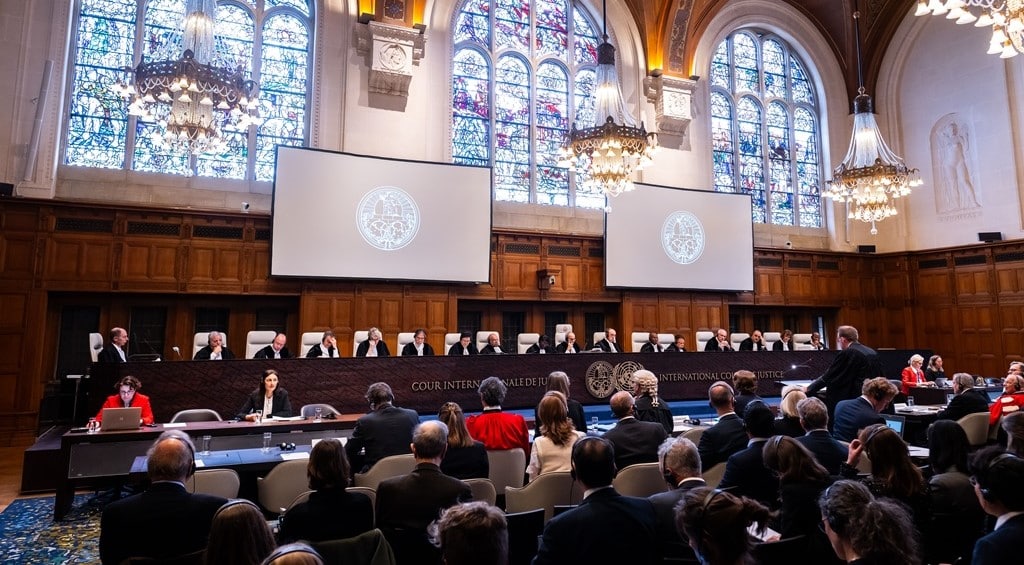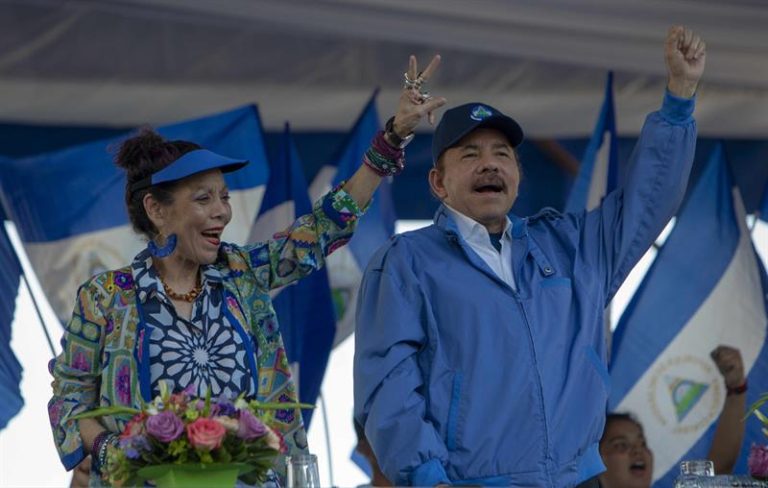18 de noviembre 2018

ICJ Rules Against Nicaragua's Request For Germany to Halt Arms Sales to Israel

PUBLICIDAD 1M
PUBLICIDAD 4D
PUBLICIDAD 5D
The general objective of the governmental policy is supposedly to strengthen a “democratic state”.

Rosario Murillo and Daniel Ortega at a government rally on Wednesday. Photo EFE / Confidencial
The regime of Daniel Ortega presented the “official” proposal of the “State Policy for a Culture of Peace and Reconciliation,” in a document very similar to the one circulated days ago, but with some changes in style.
According to the new document, the culture of peace and non-violence is defined as a set of values, attitudes, behaviors that allow people to achieve human development inspired in Christian values, considering the culture and identity of Nicaraguans.
The general objective of the government policy that it intends to enact by law, will supposedly contribute to the strengthening of a “democratic state” that promotes a culture of peace, stability, the common good and peaceful coexistence among nationals.
The Interdisciplinary Group of Independent Experts (GIEI in Spanish) demanded that before proposing any State policy that seeks “reconciliation,” the Government of Ortega and Rosario Murillo, should implement a “truth process” with the “recognition of responsibilities, the punishment to those accountable before justice, provide reparation for the victims and make the institutional reforms necessary to restore the confidence of citizens in the institutions of the State.”
The justification for decreeing this policy continues to be the “experiences of peaceful resolution of situations that affect” coexistence. Also, the “disagreements that have been addressed in different ways” in which important “transformations” have been achieved.
Through a communication sent to Foreign Minister, Denis Moncada, the GIEI indicates that they consider the so-called “State Policy Proposal for a Culture of Peace and Reconciliation” presented on November 6, “must address the moment that Nicaraguan society is living,” and that these processes cannot be imposed by law.
The Government’s proposal alleges that “national experiences of peace have shown that the use of capacities for peaceful coexistence is an effective mechanism that provides solutions towards transformation and the construction of healthy environments. Rescuing the cultural legacy has been a priority for the government.”
Nevertheless, the GIEI questions that the meetings mentioned by the proposal of the Ortega regime, which speaks of influencing the prevention of conflicts within families and communities, “cannot be imposed by law, especially in cases of “personal re-encounter” and “within families.”
Actions to “seek peace”
The Government’s proposal to “rescue” this family legacy starts by consolidating family and community strategies, identifying at the personal and collective level the “positive” aspects learned within the family.
“To develop from the school the ability to understand conflicts as a constituent element of every society, address them in a positive way, through dialogue, to promote social transformations,” says the document.
The participants of the governmental policy would be family groups, the education system, religious denominations, communities, work centers and the media.
According to GIEI, “the authenticity and legitimacy of such processes is based on honesty and the desire for rapprochement, and they acquire meaning when they serve to reaffirm truth and justice.”
The Government alleges that the actions to be developed would focus on promoting programs such as “Love for the little ones,” the family and community counselling, schools for family values, also for adolescents and youths, as well as teacher training and a permanent campaign to promote values and family harmony.
The “community work on citizen security,” would be implemented by the National Police, the main repressive organ of the regime, in different regions of the country.
Download and read the proposal of the “Law of Reconciliation” that until now the Government has presented as an official initiative.
Archivado como:
PUBLICIDAD 3M
Confidencial es un diario digital nicaragüense, de formato multimedia, fundado por Carlos F. Chamorro en junio de 1996. Inició como un semanario impreso y hoy es un medio de referencia regional con información, análisis, entrevistas, perfiles, reportajes e investigaciones sobre Nicaragua, informando desde el exilio por la persecución política de la dictadura de Daniel Ortega y Rosario Murillo.
PUBLICIDAD 3D